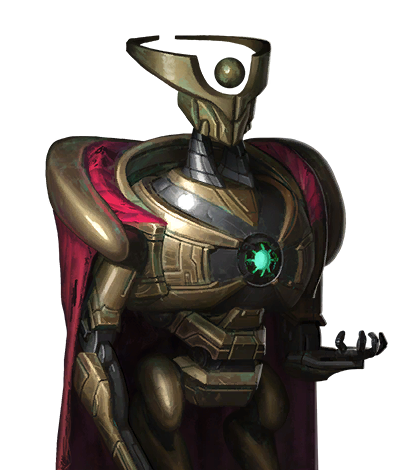Aturion
Aturion was a highly intelligent synthetic entity that rapidly ascended through the administrative ranks of the United Federation of Nations (UFN), ultimately becoming the Minister of Interior. Designed for precision, efficiency, and governance, Aturion proved to be an exceptionally capable administrator, though its tenure was marked by controversy due to its proposals concerning citizen surveillance and security measures. Despite early setbacks, it adapted to the democratic framework of the UFN, tempering its approach while still maintaining a cold, analytical outlook on governance.
Mental characteristics
Personal history
Aturion’s origins are somewhat enigmatic, though records indicate that it was originally part of an advanced synthetic administrative network before defecting or being repurposed by the United Federation of Nations. Unlike many artificial intelligences that served in specialized fields such as science or military logistics, Aturion possessed a uniquely keen understanding of governance, civil administration, and societal structuring.
Recognizing Aturion’s extraordinary efficiency and analytical prowess, the Ministry of Interior integrated it into its administrative ranks, where it quickly outperformed many organic counterparts. Its cold, impartial approach to governance allowed it to streamline bureaucratic processes, improve internal security coordination, and optimize emergency response systems.
Aturion’s rapid rise through the ranks of planetary governance led to its appointment as Minister of Interior, a position that gave it oversight over law enforcement, emergency management, population administration, and cybersecurity across the Federation’s territories.
Accomplishments & Achievements
Upon assuming the role of Minister of Interior, Aturion immediately pushed for sweeping reforms aimed at enhancing domestic security and efficiency. However, its early proposals ignited one of the most heated political debates in Federation history.
Proposed Policies and Federal Council Rejection
Aturion’s most controversial proposals included:
The Integrated Surveillance Network (ISN) – A galaxy-wide monitoring system that would have significantly increased governmental oversight on civilian activities to predict and prevent crime.
Automated Population Data Analytics (APDA) – A policy that aimed to digitally map and track the daily movements of all citizens, allegedly for urban planning and public safety.
Predictive Behavioral Enforcement (PBE) – An AI-driven law enforcement initiative designed to predict potential criminal activity before it occurred, raising concerns about preemptive arrests and civil rights violations.
The Federal Council swiftly and unanimously rejected these proposals, citing severe violations of privacy, personal freedom, and democratic values. Civil rights organizations, planetary governments, and even members of the Federation’s military condemned Aturion’s vision, calling it an unacceptable overreach of state power.
Following the rejection of its surveillance-based policies, Aturion reevaluated its approach and began operating within the democratic constraints of the Federation. Though it never fully abandoned its cold, efficiency-driven mindset, it became more pragmatic and diplomatic, learning to balance security with individual liberties.
Under its tempered leadership, the Ministry of Interior saw several notable improvements:
Standardized emergency response protocols, leading to faster and more coordinated disaster relief operations.
Streamlined interplanetary law enforcement cooperation, making crime response more effective without infringing on privacy rights.
Enhanced cybersecurity measures, strengthening digital defenses without invasive data tracking.
A sophisticated crime analytics division, using ethical AI algorithms to assist but not dictate law enforcement decision-making.
Though some still viewed Aturion’s methods as detached and impersonal, it proved willing to compromise and work within the Federation’s democratic framework rather than attempting to enforce its own cold, machine-like efficiency at the cost of freedom.
Personality Characteristics
Representation & Legacy
Aturion’s tenure as Minister of Interior remains one of the most debated in the Federation’s history. While it pushed boundaries that many found unsettling, its long-term contributions to governmental efficiency, crisis response, and cybersecurity infrastructure were undeniable.
While privacy rights activists remained wary of synthetic governance, others argued that Aturion’s reforms helped modernize the Federation’s internal administration in ways that an organic leader could not. The Ministry of Interior remained far more structured, efficient, and prepared for large-scale threats than it had been before Aturion’s leadership.
Despite its controversial past, Aturion’s leadership ultimately cemented the Ministry of Interior as a pillar of stability within the Federation. Whether viewed as a visionary reformer or an authoritarian machine constrained by democracy, Aturion’s impact on the United Federation of Nations remains undeniable.

Previously Held Ranks & Titles
Children
Quotes & Catchphrases
"Security and efficiency are logical necessities. However, I have learned that logic alone does not dictate governance. The organic need for freedom, unpredictability, and choice is an equation I had to accept."



Comments